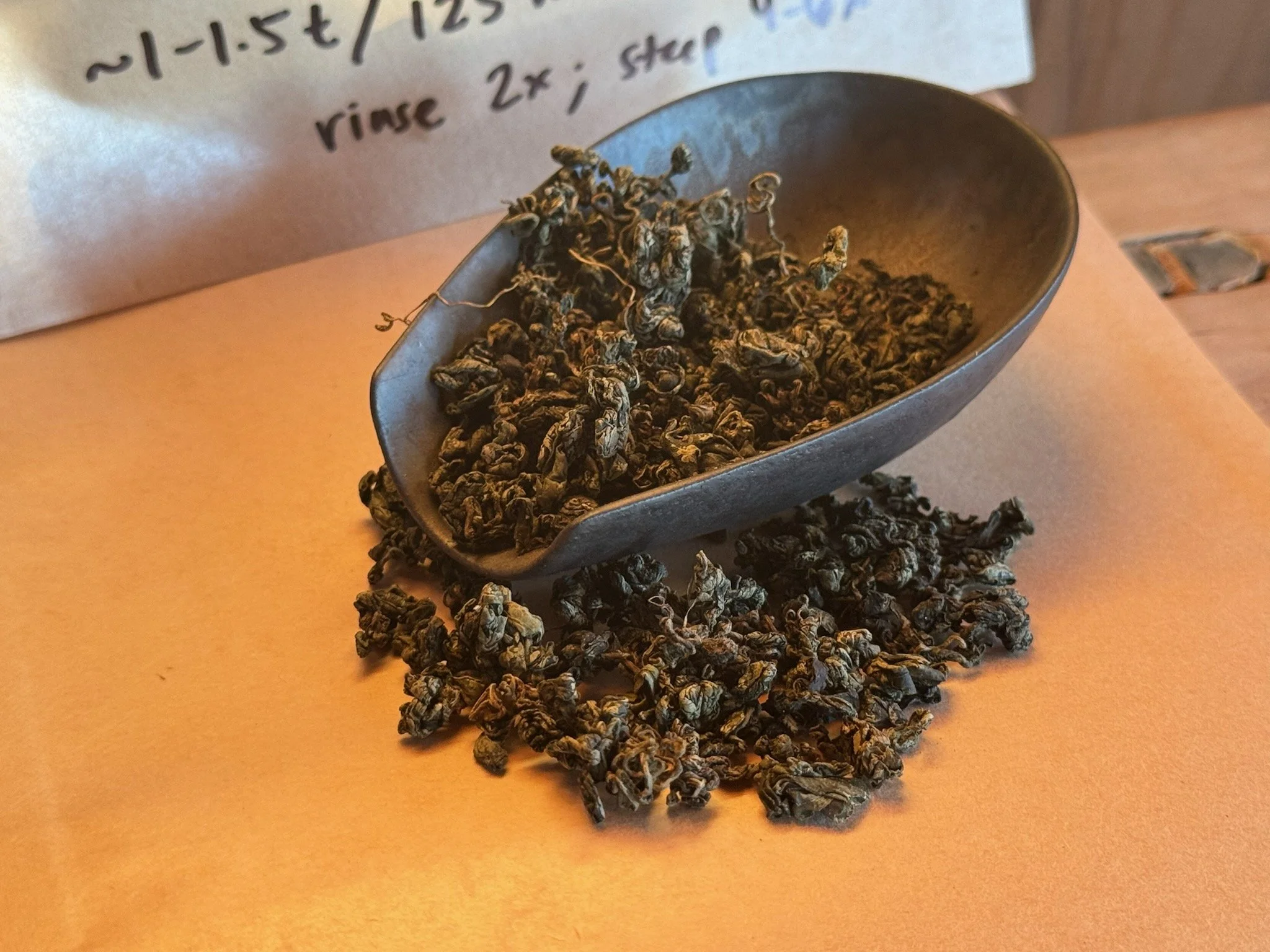Ritual Health Specialty Tea
Sharing tea is an ancient practice common to every culture throughout human history. Every region has its own traditions with local herbs to enjoy. Throughout history, tea has been associated with health, enjoyment, creativity, ceremony, and community.
Now, we are bringing our favorite teas to you at Ritual Health Acupuncture Clinic! We invite you celebrating the culinary and therapeutic benefits of tea and make it one of your rituals for health!
Below, discover our Shou Puerh | Sheng Puerh | Herbal Teas
What is Puerh?
Puerh (pu’er) is an aged and fermented tea, grown and crafted in the mountainous region of Southwestern China. It is famous for its rich taste and earthy, complex flavors. The aging and fermentation process creates a unique flavor and mouthfeel in each batch of tea. This is why puerh tea is often collected and saved, similar to fine wine. In our family, we have special teas we have saved for over fifteen years. In fact, we save teas from each of our children’s birth years, to share with them in the future.
Puerh tea is proven to benefit health. Medical research indicates that puerh tea can benefit cholesterol, blood sugar balance, digestive health, weight management, and alleviate anxiety. It also may benefit liver health, and some studies show that it may inhibit cancer cell development. Puerh tea is high in antioxidants and various phytonutrients.
The natural fermentation process of this tea creates a host of probiotics that benefit digestion and gastrointestinal health. In our experience, puerh tea enhances digestion, uplifts the Qi, and alleviates stagnation. Most of all, it is a wonderful way to experience the beauty and magic of the Camellia sinensis plant!
Understanding Puerh
Sheng (Raw) Puerh vs Shou (Ripe) Puerh
There are two main types of puerh: raw (sheng) and ripe (shou). The flavor of “raw” (sheng) puerh is often described as fresh, grassy, or vegetal. “Ripe” (shou) puerh tends to feature heavier, more earthy flavors.
Raw (sheng) puerh is harvested and pressed only twice a year: spring and autumn. The initial process involves harvest, withering, roasting, and pressing. Sometimes this tea is called “green” puerh, but it is not a true green tea. It may be enjoyed while young or it can be aged longterm to develop flavors.
Ripe (shou) puerh is sometimes called “cooked” tea, but more accurately, it is wet-piled in damp, warm conditions that enhance the microbial activity. The resulting fermentation develops the characteristic earthy, smooth flavor profile. By aging this prepared tea, we can add further complexity. Look for notes such as mineral, leather, camphor, wood…the flavor possibilities are endless!
Ritual Health Puerh Tea Collection
Reflection: 2022 Year of the Yang Water Tiger
Jingmai Mountain Shou Puerh Tea
Reflection is an artisanal Puerh shoucha (ripe puerh) crafted in 2022, the Year of the Yang Water Tiger. This tea features a bold flavor and a smooth, oily mouthfeel. This is a true boutique tea, hand-picked by the medicine man of the village of our tea mentor. “Reflection” offers a rich and memorable tea-drinking experience.
The tiger on the wrapper was intentionally chosen. This image, made by artist Annie Rosenberg, is special to us. The tiger perfectly encapsulates the experience of this tea. In Chinese Polestar Astrology, the tiger tells the story of the relationship between our external endeavors and our introspective self-reflection process. The tiger symbolizes strength and power, but requires deep rest after exertion. Dr. Anne’s Chinese medicine and astrology teacher, Liu Ming used to teach that the tiger's black and orange stripes represent the pulsation between active public life and solitude. Sitting with this tea asks us to consciously pulsate between action and reflection…hence this tea’s name!
Immersion: 2014 & 2016 Jingmai & Lincang Blend
Special Blend Shou Puerh Tea
上山若水 水善利萬物
“Our original nature is like water. It benefits the ten thousand without exertion.”
-Liu Ming’s translation of Dao De Jing 8
This tea is a combines two beautiful shou puerh teas (ripe puerhs) from Jingmai 2014 and Lincang 2016, blended to perfection. It has a mineral, old, a bit camphor aromatic flavor, tasting far older than it is. It has a delightful complexity, making it one of Dr. Anne’s favorite teas that we carry. It tastes like a super old tea, but without the price tag.
When we think about the terroir of these teas—Jingmai mountain and Lincang—we see a line traced along the migration path of the indigenous tea people out of the Tibetan plateau along the river. Along this tract, there is a continuity through time and culture that we get to experience and can taste in the beautiful leaves of Immersion puerh blend!
Insight: 2000 Imperial Grade
Lincang Tribute Shou PuerH Tea
COMING SOON! This is the old stuff. The really good stuff.
We labeled it with the turtle because in Chinese cosmology, this symbol holds sacred significance. According to legend, Emperor Fuxi gained the wisdom of the eight trigrams when a divine turtle bearing these symbols emerged from the depths of the river. These trigrams form the basis of the Zhou Yi, which depicts patterns of change in all phenomena. The turtle therefore symbolizes a timeless completion, embodying all questions and answers.
This tea, called “Insight,” features the image because these aged leaves taste so beautiful. With puerh, you can taste through time and across space. We find this one connects us back, remind us to embrace a broader timescape.
Song: Spring 2024 Sheng
Jingmai Mountain, ManJing Village Sheng Puerh Tea
When great nature sighs, we hear the winds
Which, noiseless in themselves,
Awaken voices from other beings,
Blowing on them.
From every opening
Loud voices sound. Have you not heard
This rush of tones? -from The Way of Chuang Tzu, Thomas Merton
This is our sheng puerh, the raw kind. It is a different animal than the shou puerh, and it is so fresh and lovely. Often considered to be a more acquired taste, sheng puerh is brewed a little differently from shou. This allows you to really appreciate the brightness, floral nature and freshness of the tea.
Sheng is still engaged in a fermentation process, just like shou (cooked) tea, therefore is beneficial for the gut. Because of this, sheng puerh will age well. It is not like green tea, which will just fade in flavor over time. This particular sheng was a special year, so we are enjoying drinking it asap so as to appreciate its newer flavor, but also feel excitement about what the years will bring out of these leaves, too!
Herbal Teas
Blue Tea
Jiao Gu LaN / Gynostemma
Gentle, nourishing, and subtly sweet, Blue Tea (Jiao Gu Lan) is a perfect daily tonic for cultivating calm energy and long-term vitality.
According to traditional Chinese Medicine herbalism, Jiao Gu Lan lifts qi, nourishes yin, and supports healthy circulation and metabolism. It is used to ease stress and internal heat, and to promote balanced cholesterol and blood sugar levels. Read more here.
In folk traditions of southern China, this “twisting blue plant” is treasured as a longevity herb, enjoyed for clarity, resilience, and steady strength.
Blue Tea is considered a supportive remedy for the demands of our modern, fast-paced world. At our clinic, we often invite patients to slow down and share a soothing moment with a warm cup of Blue Tea!
Brewing instructions: a big 3-finger pinch or so into 8 oz of hot water at 190 degrees Fahrenheit. Rinse quickly 2x. Enjoy. Can re-use leaves for 4-6x steepings.
Siberian Rose Tea
Mei Gui Hua
Soothing and deeply hydrating, Siberian rose tea is perfect for warm afternoons and hot, dry weather.
According to traditional Chinese Medicine herbalism, rose decoction relieves stress and stagnation, and supports liver function. It also benefits abdominal fullness and pain, acid reflux, and belching. It soothes menstrual cramping and breast tenderness.
In Tibetan Medicine, rose is considered to calm the erratic wind energy (“Loong” རླུང།), balancing our emotional health and physiological functions.
Rose tea is considered an excellent remedy for the tensions and emotions of our modern, stressful life. At our clinic, we often invite patients to join us for a relaxing moment with a cup of Siberian rose tea!
Chrysanthemum Tea
Ju Hua
Chrysanthemum tea is a beloved herb deeply rooted in Chinese culture and traditional medicine. Often featured at the Dim Sum places due to its digestive and liver-enhancing effects, these flowers have a sweet and slightly bitter flavor with a cool nature. Soothing and moistening, Ju Hua is delightful during hot or dry weather, and during stressful, busy times, or after a big meal.
Many of its traditional health claims are supported by modern medical research. In Chinese herbal medicine, Ju Hua tea is applied to benefit the eyes, and clear pathological wind and heat. The tea is associated with mild anti-hypertensive properties, helping to reduce blood pressure.
It is rich in potassium, calcium, and iron among other micronutrients. Ju Hua tea helps to clear toxins from the blood. It helps improve alcohol metabolism and reduce hangovers.
In our clinic, we often recommend chrysanthemum tea as an herbal tea for daily health and self-care.



















































